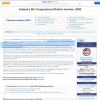hanimmal
Well-Known Member
https://www.washingtonpost.com/world/2021/06/08/fbi-app-arrests-australia-crime/

SYDNEY — An international coalition of law enforcement officials announced Tuesday that they had ensnared alleged criminals around the world after duping them into using phones loaded with an encrypted messaging app that was controlled by the FBI.
The audacious effort, led by the FBI, Australian police and a host of European law enforcement agencies, gave the officials a window into the conversations of criminal networks as people traded photos of cocaine packed into shipments of fruit, plotted robberies and put out contracts for killings.
Law enforcement officials — some of whom on Tuesday could barely contain their glee — announced they had arrested more than 800 people and gained an unprecedented understanding into the functioning of modern criminal networks that would keep fueling investigations long past the coordinated international raids that took place in recent days.
The effort was “one of the largest and most sophisticated law enforcement operations to date in the fight against encrypted criminal activities,” said Jean-Philippe Lecouffe, the deputy director for operations of Europol, the agency that coordinates police activity among the 27 European Union countries, in a news conference in The Hague.
U.S. law enforcement officials were expected to announce further details of the operation later Tuesday.
How America’s surveillance networks helped the FBI catch the Capitol mob
For nearly three years, law enforcement officials have been sitting in the back pocket of some of the world’s top alleged crime figures. Custom cellphones, bought on the black market and installed with the FBI-controlled platform, called AN0M, circulated and grew in popularity among criminals as high-profile crime entities vouched for its integrity.
The FBI in the past has dismantled encrypted platforms used by criminals to communicate, and infiltrated others. This time, it decided to build an encrypted app of its own to target organized crime, drug trafficking and money laundering activities across the globe.
A breakthrough came after Australian police met with the FBI in 2018 over a couple of beers, according to officials. The Australians then built a technical capability to access, decrypt and read communications on the FBI’s platform.
The users believed their AN0M devices were secured by encryption. Instead, they were feeding criminal intelligence directly to law enforcement agents.
“Essentially, they have handcuffed each other by endorsing and trusting AN0M and openly communicating on it — not knowing we were watching the entire time,” Australian Federal Police Commissioner Reece Kershaw said.
The global operation, known as Special Operation Ironside in Australia and Trojan Shield in the United States and Europe, has allegedly exposed criminals linked to South American drug cartels, Triad groups in Asia, and criminal syndicates based in the Middle East and Europe. A total of 17 countries took part in the effort.
Officials said that raids in those countries in recent days had impounded more than eight tons of cocaine, 22 tons of marijuana and hashish, two tons of methamphetamine and amphetamine, 250 firearms, 55 luxury vehicles and more than $48 million in cash and cryptocurrencies.
The operation has “struck a heavy blow against organized crime,” Australia’s Prime Minister Scott Morrison said. “Not just in this country, but one that will echo around organized crime around the world.”
More than 9,000 law enforcement officers were involved, sifting through 27 million messages that were sent on via the app over the 18 months of the operation. The alleged criminals used the system like an illicit WhatsApp or text message system, communicating in 45 languages to trade details of their activities, officials said.
“To give you an idea of the magnitude of our penetration, we were able to actually see photographs of hundreds of tons of cocaine that were concealed in shipments of fruit. We were able to see hundreds of kilos of cocaine that were concealed in canned goods,” Calvin Shivers, assistant director from FBI’s Criminal Investigative Division, told reporters in The Hague. “The results are staggering.”
Officials described a wide-ranging, disruptive effort that they said they hoped would deliver a serious setback to criminal networks in their countries.
In Australia, police used information as the operation was underway to seize 3.7 tons of drugs, 104 weapons, and some $35 million in cash. During that time, the alleged criminals had no idea why their drugs were being seized, and their plots foiled, police said.
Police said they disrupted a number of possible homicides, including one plot involving plans to shoot a family of five at a cafe.
In Sweden, which has struggled with drug networks in recent years, a top official said they had “performed one of the most important strikes ever” against violent crime and drug networks.
The official, Linda Staaf, head of intelligence for the Swedish Police Authority, said that in recent days, 70 suspects had been arrested, “many of them persons with essential roles and heavy influence on the drug market. Those who instigate murders and violence by shootings and explosions right in the middle of Swedish society.”
A top Dutch police official reveled in what she said was the app’s success.
“It has a good reputation among criminals. They mutually promote it as the platform you should use for its absolute reliability,” said Jannine van der Berg, chief commissioner of the national unit of the Dutch police. “But nothing was further from the truth.”







